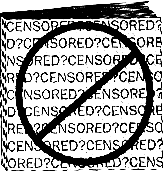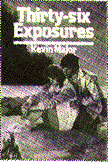






|
Censorship
The Role of the Reviewing Journal
Volume 18 Number 3
Book reviewers Dave Jenkinson and Pat Bolger look at "selection" censors and "censoring" reviewers and force us to consider our role in the book selection process. Are book reviewers supporting censorship in the school and public library? What is book reviewing? Censorship wears many faces. It appears in its most recognizable form when individuals or groups in a community succeed in having a book or other material permanently removed from the shelves of a school or public library. Such censorship frequently attracts much media attention and may generate strong outpourings of pro-and anticensorship feeling. Because these overt occurrences of censorship are fortunately not daily events in most locales, it is perhaps easy to believe that, while the threat of external censorship may be omnipresent, its actual manifestation is relatively rare. 
I would suggest, however, that in some of its other guises, censorship is always with us. "Silent" censors, for example, are those school or public library system employees who seek to remove materials from the system without the noisy fanfare that usually accompanies externally generated censorship. Silent censorship by school or library staff members can manifest itself in a number of ways. The "light-fingered" censor disagrees with the results of the selection process, but does not wish to use the available formal structures to make these objections publicly known. Instead of asking that a book be reexamined by some reconsideration process, these "Light-fingered" censors move directly to a personal "resolution" stage by surreptitiously stealing the offending material. At inventory time, the silently censored title becomes just another "missing" book, which may or may not be replaced. "Authority" censors, on the other hand, use the power embedded in their position to have materials removed. In schools, these people, usually administrators, invoke their line authority either by directly ordering that titles be removed or by having an informal "chat" with the librarian and suggesting that in order to avoid possible unpleasantness with the local community later, it might be in everyone's best interests simply to remove the offending title(s) now. 
Common to the above two forms of silent censorship is the fact that the materials had been purchased and placed on library shelves before they were removed and, consequently, the possibility does exist that the censorship wrongs might be righted. The "light-fingered" censor may be caught in the act or someone may stand up to and challenge the "authority" censor. Unfortunately, another type of silent censorship exists which is much more difficult to detect directly, for it occurs before materials are purchased. The "selection" censor uses the selection process as an opportunity to prevent "suspect" materials from becoming part of a school or public library collection. Some may argue that all selectors censor -- since selectors do not purchase all books but in fact reject some, the rejected titles have therefore been "censored." Those who argue in such a manner do not understand the essential difference between selection and censorship. The selector approaches each potential purchase with the positive attitude, "How might this title contribute to my collection and the purposes for which it is being created?" The "selection" censor's starting position is quite different. Armed with a mental checklist of qualities or characteristics that would disqualify an item, the "selection" censor asks, "Does this item contain anything that might be offensive to someone?" To be effective in weeding out potentially offensive titles, "selection" censors who make use of current selection tools require the co-operation of "censoring" reviewers, who draw attention to those parts of a work that would allow a "selection" censor to disqualify an item for purchase. Consider the following two examples taken from a reputable American reviewing source. A positive review of Kevin Major's Thirty-six Exposures concludes with the following sentence: "Older adolescent boys should identify with Lorne, a more assertive character than Jerry in The Chocolate War, but some parents may object to the strong language and explicit references to sex." Another positive review, this time of Leon Garfield's The Strange Affair of Adelaide Harris, ends by saying, "The squire's earthiness may offend some, but the broad humour and convoluted action make for fun reading." "Earthiness" may be more obtuse than "strong language" but the "censoring" reviewer's meaning is nevertheless clear. For the "selection" censor, the "correct" path is obvious. Though both books come from award-winning authors and both books merit purchase, each has also been identified as a title that could cause problems and, consequently, should be bypassed. Consider, as well, the effects of becoming a "censoring" reviewer. The following recently published Canadian books are all perfectly good reads, and I would readily recommend each of them for purchase. But let's suppose I wanted to consider each book from the "censoring" reviewer's viewpoint. What might I find to be potentially offensive in these books that would give me cause to warn my fellow quiet censors against purchasing them? Take, for example, Rhoda Kaellis' The Last Enemy, a very moving story about Lilly, a pre-teen Jewish girl, who comes to New York to live with relatives following World War 11. Lilly's parents had been killed in a concentration camp and Lilly had been "hidden" in a Catholic orphanage. As the years pass, Lilly experiences enormous emotional struggles as her Catholic upbringing conflicts with her new Jewish "home." Unfortunately, the book's ending is not uplifting and is actually a real "downer." Lilly, seeking permanent relief from her problems, commits suicide by sticking her head in a gas oven -- certainly not a model of behaviour for dealing with difficulties we would want impressionable teens to emulate! Another poor model is fourteen-year-old Vicky from Cherylyn Stacey's I'll Tell You Tuesday, If I Last That Long. The novel is quite amusing, but Vicky shows poor judgment. She dates an eighteen-year-old, gets drunk, smokes marijuana, and ends up alone with him on a deserted beach with him where, we are told, he "smoothly eased me out of my t-shirt." Carol Matas' Vesper, a companion novel to her award-winning Lisa, is a fine historical novel about a young man's activities with the Danish Underground during World War 11, but might not some young readers be unduly shocked by Matas' graphic description of the mutilated hands of the central teen character? For, you see, the Gestapo had pulled out Jesper's fingernails while torturing him to get him to betray his fellow resistance fighters. If you examine my "censoring" reviewer style, you will recognize that my treatment of the books shared some common characteristics. To point out the "bad" parts of a book to a "selection" censor, I generally did not look at the book as a whole but instead focussed on isolated pieces or incidents from the books and dealt with them out of context. Some "alerting" words I used, such as "graphic," lack precision while being highly loaded with connotative meanings. It is easy to be a "censoring" reviewer. One need only approach each book with a checklist of "no-nos": sex, language (i.e. profanity), inappropriate behaviour (i.e. poor role models), violence, and witchcraft and the occult (and you can add many other "objectionables"). But what are we attempting to do when we review a book? The three key words are review a book. A reviewer reads the entire book and reviews the entire book, not just selected passages. To place warnings in a review about certain aspects of a book's contents is not to review a book, it is to label the book. Such labelling skews the review by inflating the work's supposed "flaws" at the expense of its virtues. The part of the review that will be remembered and acted upon, certainly by the "selection" censor, is not the review's positive points but the label it bears. Reviewers should not play that game. My own refusal to become a "censoring'' reviewer will not cause "selection" censors to disappear, but it will make their task more difficult. Perhaps, in having to meet some public controversy, the "selection" censors will discover that there are people -- right in their own institutions and in the larger community -- who not only believe that children and young adults should have open access to reading, viewing and listening materials but are also prepared to come forward and defend materials that are challenged. Dave Jenkinson argues that a review's references to possibly offensive aspects of a book enable the "silent" censor to eliminate books from consideration for acquisition. Although both reviewers and librarians selecting books for their collections will be obliged to examine their consciences, there is a case to be made for the inclusion of such references in book reviews. The problems inherent in book selection for children and adolescents are often compounded for school librarians, who may be struggling with a shortage of funds for book acquisitions (library budgets of a few hundred dollars are not unheard of), lack of time (most of those in smaller schools must assume some classroom teaching duties), and the possibility of intervention by "authority censors," which Jenkinson raises. These librarians, with all their problems, are dancing as fast as they can, and they don't need surprises. They are the ones who can make judicious use of the "implicit warnings" to which he objects. Librarians must be confident that they can defend the decision to include any title in their collections or be prepared to back off and remove a book -- and removing a book is doubly undesirable where budget constraints are pinching already. A favourable review with an implicit warning does not say to selectors, "Don't buy this book!" but it will alert them to read it and perhaps to consult classroom teachers on ways to use it effectively. If an administrator should come and question a certain title's inclusion in the collection, how nice for the librarian to be able to point out the qualities that balance any discomfort an isolated passage may cause. (Most administrators will accept the librarian's judgment and go on to the next crisis on their agenda.) And being prepared will certainly strengthen the position of the librarian if a book is more seriously challenged. One must agree with Jenkinson that there are selectors who will use implicit warnings to keep their collections free of any book that could occasion criticism, no matter how good it might be otherwise. They are, one hopes, relatively few in number, and it seems almost pointless to set them up to purchase a book which they will then feel compelled to withdraw. A favourite argument used by those who wish to censor books for young people suggests that information is dangerous because it may be misused (commonly expressed in the notion that providing information on birth control to young people will cause them to become promiscuous). It seems ironic that in opposing censorship we could be, in effect, using a similar argument -- some librarians will misuse certain information about a book, so we should therefore not make it available. CM subscribers may, like this writer, fully agree with Jenkinson that we are obliged to fight censorship but still prefer to have implicit warnings included in reviews where they are warranted. Perhaps readers can contribute their own views to this debate! Dave Jenkinson teaches courses in children's literature and adolescent literature in the Faculty of Education at the University of Manitoba. He has reviewed juvenile fiction and non-fiction for a number of publications for the past twenty years. Pat Bolger recently retired from a career as a teacher and librarian in a number of Ontario high schools. She writes book reviews for CM, Reviewing Librarian and Ontario History. |


1971-1979 | 1980-1985 | 1986-1990 | 1991-1995

The materials in this archive are copyright © The Manitoba Library Association. Reproduction for personal use is permitted only if this copyright notice is maintained. Any other reproduction is prohibited without permission
 Digital Collections / Collections Numérisees
Digital Collections / Collections Numérisees
